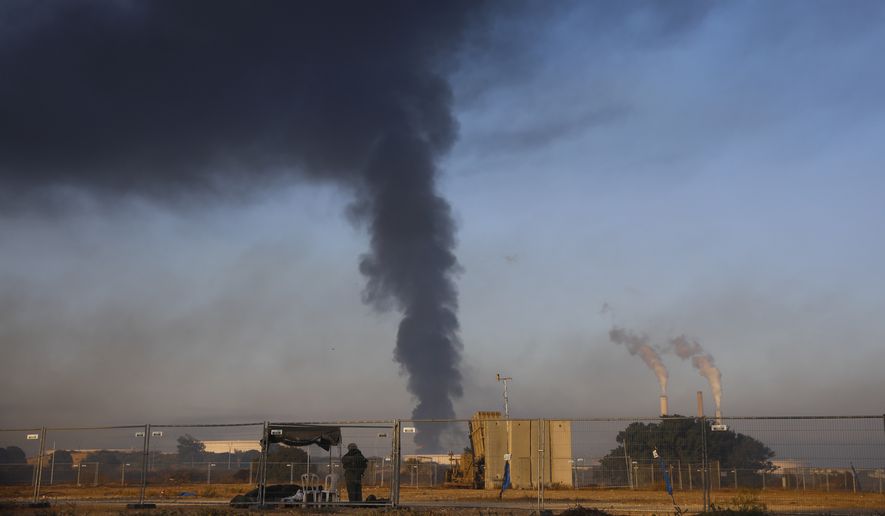Israel‘s state-of-the-art Iron Dome missile defense system is facing its toughest test to date amid rapid-fire rocket attacks from Hamas, with military analysts in Israel openly wondering whether the Palestinian militant group has found a strategy to partially pierce the shield.
The Iron Dome has succeeded in intercepting the vast majority of the thousands of rockets fired by Hamas from the Gaza Strip, where Israel has retaliated with crushing military strikes of its own that have led to dozens of deaths and a level of violence not seen since the two sides went to war in 2014.
But at least several Hamas rockets have gotten through the missile defense system, and at least six Israelis have been killed. Israeli firefighters also have been working for more than 24 hours to extinguish fires at a petroleum facility south of the city of Ashkelon that erupted in flames after being hit by rocket fire.
Observers say it appears Hamas has the ability to fire a greater number of rockets at a faster pace than ever before. In the past, Hamas hasn’t had the ability to effectively challenge the Iron Dome and seemed to lack the necessary firepower to truly threaten major population centers and economic hubs such as Tel Aviv.
“But on Tuesday and Wednesday morning, Hamas appeared to have succeeded in firing more than 100 rockets within minutes, including a sizable number focused on Tel Aviv. This is a jump both in the number of rockets being used against Tel Aviv, and in the terrorist group’s ability to fire a high volume of rockets simultaneously,” Yonah Jeremy Bob, the Jerusalem Post’s intelligence, terrorism and legal analyst, wrote in a piece Wednesday.
“Does this mean the Iron Dome is no longer effective? No,” he wrote. “It still intercepts the majority of rockets fired at Israeli population centers, although some are getting through. The bigger question is whether Israeli intelligence estimates are correct that Hamas has only a few hundred missiles which can reach Tel Aviv.”
While the overwhelming number of rockets fired by Hamas have been intercepted, analysts say the group’s leaders have a secondary goal: to bleed Israel financially.
Israel has 10 Iron Dome batteries, each costing about $100 million. Every interceptor fired to stop Hamas rockets costs at least $40,000, possibly as high as $80,000, according to some estimates.
Michael Rubin, a former Pentagon official and now a resident scholar at the American Enterprise Institute wrote in an analysis published Tuesday on the think tank’s website that Hamas and its allies are aiming to “wage an economic war of attrition” against Israel.
“They can drain tens of millions of dollars from the Israeli economy at little cost to themselves,” he wrote. “The Iron Dome has so far intercepted more than 2,500 rockets, at a cost of $100 million. Given that Hezbollah has over 100,000 rockets aimed at Israel and Hamas many more, costs could skyrocket even if, admittedly, the cost of active defense is admittedly less than the passivity of simply accepting the blows.”
The Iron Dome system was developed by the Israeli firm Rafael Advanced Defense Systems and Israel Aerospace Industries. The system reportedly has a success rate well above 90%.
But it will likely be tested more than ever before in the coming hours and days.
Israeli airstrikes on Wednesday reportedly killed Bassem Issa, a Hamas military commander and the highest-ranking Hamas official to be killed in fighting with Israel since 2014. The death could spark an even more furious round of rocket attacks.
• Ben Wolfgang can be reached at bwolfgang@washingtontimes.com.




Please read our comment policy before commenting.